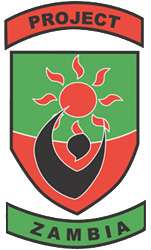Project Zambia
 | |
| Motto | Help us to stand and we can walk on our own, You can't change the world, but you can help change our world |
|---|---|
| Founded | 2002 |
| Type |
Non-profit Education |
| Location | |
| Fields | Development |
Key people | Kevin Burke, Dr Aidan Donaldson, Mr Peter Tembo |
| Website | projectzambia.com |
Project Zambia (Irish: Tionscadal Saimbia) was initiated by St Marys CBGS Belfast, Northern Ireland, in 2002.
It was a response by a school in Belfast to the cry of the poverty-stricken people of the compounds of Lusaka, Zambia. Since then the project has grown, spreading to communities throughout Belfast. Project Zambia is today undertaken in association with the Congregation of Christian Brothers, and a recently created NGO, Edmund Rice International.
Goals
Working in partnership with the people in Zambia the Project seeks to help, support and empower the host communities to develop solutions to their problems and difficulties.
The Project also seeks to raise awareness of the conditions and causes that offend the human dignity of so many people throughout the world and to forge close bonds of solidarity between communities in Ireland and communities in Zambia.
Intended to link and unite people in Ireland and Zambia, it is hoped that it will help to transform lives and communities in both the rich western world and sub-Saharan Africa.
Misisi compound
Misisi compound, the primary location for major Project Zambia efforts, is a shanty town home to around 80,000 people, and is one of the most deprived areas in sub-Saharan Africa. HIV is common among adults and children, many of whom have lost their parents to the disease. Average life expectancy is just 32. The lack of clean water has led to regular cholera outbreaks, long eradicated in the western world but still a killer in underdeveloped countries.
As in many Zambian Urban Compounds, food is scarce. Project Zambia is making headway in creating both long and short term solutions to this problem. As well as extending the agricultural project, and providing chicken runs, it is also creating social economy projects, the profits of which feed back into the various projects. An example of this would be the bakery project.
Mapepe Village
Mapepe Village, on the outskirts of Lusaka, Zambia, was recognised as a potential area of development for Project Zambia. Since beginning the development in Mapepe. A school has been built with further development planned for future groups. A chicken run has also been completed, April 2009. This has already brought sustainable income to the people of Mapepe. Two bore holes have also been installed to supply the 2000+ villagers with clean water. Further development is to come in the form of a piggery, a block-making facility, which will be used to improve housing in the village.
Work
The St. Lawrence’s Centre in Misisi is entirely transformed with the following achieved so far:
- four new classrooms in the school
- major extension completed in the special needs centre
- eight teachers salaries paid
- teachers’ accommodation block and community hall complete
- bore hole and irrigation system put in place leading to the tripling of maze production and a mill built helping with the processing of the maize
- agricultural programme extended and work is on-going
- bakery and chicken runs complete
- three dormitories completed at the Home of Hope
- new kitchens installed for the Home of Hope
- new TV and Games room fitted in the Home of Hope
- renovation of special needs playground
- clean water supply installed for the school canteen
- joinery workshop outfitted with new tools and equipment
- work on piggery has begun
In Kabwata Orphanage the following has been funded:
- blankets for the children for the cold season
- new plumbing system installed in the orphanage
In Old Kabweza Village (45 km east of Lusaka) they have funded the building of a new four-classroom school.
- Teachers accommodation is also being built